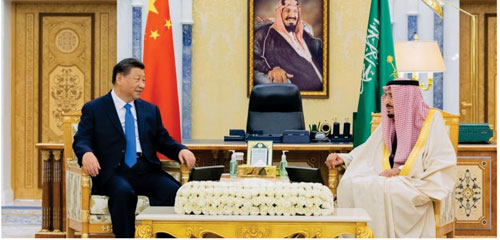Xi Jinping Visit: The Chinese Largest Diplomatic Initiative in the Arab World
For more than two thousand years, the Chinese and Arab civilizations, linked by the ancient Silk Road, have engaged in cordial exchanges to interact and inspire each other across the Asian continent. It was through these interactions that the Chinese and Arabs left a glorious chapter in the history of East-West interaction and mutual learning, leaving behind a legacy of trade, innovation, dissemination of cultural achievements and contribution to the development of human civilization. Currently, with the unprecedented changes going around in the world, China and Arab countries are constantly working together on the shared challenge of ensuring peace and development worldwide.
In a recent three-day state visit to Saudi Arabia, Chinese President Xi Jinping participated in the first China-Arab States Summit and the first China-Gulf Cooperation Council (GCC) Summit in an effort to strengthen the historic ties and strategic partnership between China and Arab countries. The visit was intended to build on the past while also paving the way for a brighter future, carrying forth traditional friendship and ushering in a new era in China’s relations with the Arab world, Arab Gulf states, and Saudi Arabia.
During the first China-Arab States Summit, the leaders of both sides mapped the course for future cooperation, strengthened bilateral ties and solidified their accord on significant issues including global governance, development and security and dialogue between civilizations. The two sides have also been demonstrating their responsibilities for enhancing and revitalizing the China-Arab strategic alliance through exercised multilateralism, expanded practical collaboration and bolstered coordination in international and regional affairs.
The previous visit of Chinese President Xi Jinping to the Kingdom in January 2016 and King Salman’s visit to China in March 2017, as well as Crown Prince Mohammed bin Salman’s visit to China in February 2019, have ripped positive and fruitful outcomes that resulted in expanded cooperation between the two countries in various fields, thus making Saudi Arabia a strategic partner of China in the Middle East and Islamic World.
In recent years, China-Saudi Arabia relations have shown a considerable degree of growth. Being the world’s largest buyer of oil, China purchases 25% of oil and 27% of chemicals from all of Saudi Arabia’s production. China is also Saudi Arabia’s biggest trading partner as well as a growing source of investment. Similarly, Saudi Arabia is China’s major Middle Eastern trading partner. In the first ten months of 2022, Saudi oil accounted for 18 percent of all Chinese oil imports, reaching a total of 1.77 million barrels per day, making it China’s largest individual oil supplier. In 2021, bilateral trade reached roughly $87 billion, of which 95% was made up of oil, polymers, and other chemical items. Additionally, Saudi Arabia has made substantial investment in exclusive contractual agreements with Chinese oil refineries.
In conjunction with Beijing’s largest diplomatic initiative in the Arab world, the two sides inked a number of partnership agreements, including ones concerning hydrogen energy, the Middle East Green Initiative, the kingdom’s Vision 2030, and China’s Belt and Road Initiative. China is all set to actively participate and contribute to Saudi Arabia’s industrialization and diversification of its economy. The two parties are also diligently working to achieve more results in all areas of bilateral cooperation.
The two sides also emphasized the significance of boosting cooperation in relation to the “Belt and Road Initiative.” The Saudi companies’ engagement in energy and investment partnerships within the BRI will enhance the Kingdom’s position as a regional hub for Chinese companies, energy projects in the region, and energy-consuming nations in Europe and Africa. All of these factors will contribute to the development of Saudi local content and China’s attainment of self-sufficiency in the sector of petrochemicals through investment in the Kingdom. Furthermore, a new historic milestone in the longstanding friendship and collaboration of the Chinese and Arabs was achieved through the establishment of a Sino-Arab future-oriented strategic partnership of comprehensive cooperation and common development.
The cooperation between the two countries was not confined to the aforementioned fields but expanded to include cultural exchange as well. After the Saudi Ministry of Culture announced the Prince Mohammed bin Salman Award for Cultural Cooperation between the Kingdom of Saudi Arabia and China in 2019, both countries were very keen to boost scientific and cultural relations. Therefore, they further aimed to promote the Arabic language and creative arts, fostering mutual understanding and cultural exchange between Saudi and Chinese cultures, which will serve the cultural objectives of Saudi Vision 2030 and China’s Belt and Road Initiative. Moreover, China also designated Saudi Arabia as a tourist destination for Chinese tour groups in an effort to increase bilateral tourism and intercultural contact between the two countries. The top brass of both, China and Saudi Arabia, are eager to use their political and economic might to advance their nations’ shared goals.
China prioritizes developing its relations with Saudi Arabia as a part of its foreign policy and international diplomacy. However, it does not pursue its self-interests, nor participate in the geopolitical competition, and does not carve out zones of influence. Rather, it promotes a spirit of equal and cordial partnership and respects the individual decisions of countries in the region, putting positive energy into the building of peace in the Middle East through cooperation.
China and Arab states have long been mutually beneficial partners and good brothers enduring thick and thin together. In the face of urgent global issues such as a stagnant global economy, growing income divides, rising bloc politics and increasing food and security crises, the two countries must unite in order to strengthen cooperation and overcome numerous international challenges.
In the years to come, China will continue to work with Arab countries to promote their longstanding friendship and construct a China-Arab community with a shared future in order to contribute more to the world’s sustainable peace and development.










